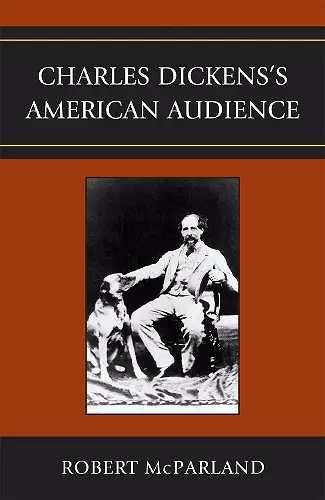Charles Dickens's American Audience
Format:Hardback
Publisher:Lexington Books
Published:14th Jun '10
Currently unavailable, and unfortunately no date known when it will be back
This hardback is available in another edition too:
- Paperback£44.00(9780739118580)

From 1837 to 1912, Charles Dickens was by far the most popular writer for American readers. Through several sources including statistics, literary biography, newspapers, memoirs, diaries, letters, and interviews, Robert McParland examines a historical time and an emerging national consciousness that defined the American identity before and after the Civil War. American voices present their views, tastes, emotional reactions and identifications, and deep attachment and love for Dickens's characters, stories, themes, and sensibilities as well as for the man himself. Bringing together contemporary reactions to Dickens and his works, this book paints a portrait of the American people and of American society and culture from 1837 to the turn of the twentieth century. It is in this view of nineteenth-century America—its people and their values, their reading habits and cultural views, the scenarios of their everyday lives even in the face of the drastic changes of the emerging nation—that Charles Dickens's American Audience makes its greatest impact.
Robert McParland's insightful book provides a fascinating account of Dickens's role in shaping America's social and cultural identity in the nineteenth century. The author interestingly outlines the many ways in which American readers engaged with Dickens's works, and the ways in which Dickens's books influenced American ideologies. McParland supplies a wealth of material to substantiate his arguments in this well-written book. -- Katie Halsey, University of Stirling, University of Stirling
This book goes beyond simply defining and hearing testimony from the Dickens-reading community in America. It closely examines a historical time and an emerging national consciousness that defined the American identity before and after the Civil War. As McParland writes, 'Dickens was part of the conversation' about what America was and who Americans wanted to be. This is a very lively and diverse examination of the tremendous influence that Dickens himself and his published works exercised upon the formation of the American character in the nineteenth century. -- William Joseph Palmer, Purdue University
Ronald Zboray opened the topic of Dickens's significance for American readers with his A Fictive People (1993). The argument goes that Dickens's fiction helped create social solidarity among postcolonial readers, who understood his characters, images, and themes and shared his sentiments. McPartland delved into letters, autobiographies, and the media, and here provides a diligent, thorough treatment of Americans' response to several of Dickens's works. He discusses, for example, how Little Nell's serialized life sent Americans to the Boston docks in search of an incoming installment of The Old Curiosity Shop that would reveal whether or not Dickens had killed her off; Frederick Douglass's belief that Uncle Tom's Cabin was akin in spirit to Bleak House; and Louisa May Alcott's inclusion, in Little Women, of a chapter devoted to a Pickwick Club. In sum, American audiences interpreted British culture through Dickens and compared it to their own. This pervasive influence resulted from Dickens's ability both to create an engaging, imaginative world and to appeal for social justice (which moved reformer Lydia Maria Child to applaud Dickens as an 'apostle of humanity'). McPartland underscores Dickens's importance as not only a literary icon but also a commodity in late-19th-century America. Summing Up: Highly recommended. * CHOICE *
...a significant work of scholarship....The range of sources it marshals...makes it a valuable study offering scholars access to a wealth of nineteenth-century American responses to Dickens. * Victorian Studies *
- Winner of Received the Bela Kornitzer Book Award for Alumni 2011;.
ISBN: 9780739118573
Dimensions: 241mm x 163mm x 25mm
Weight: 560g
252 pages